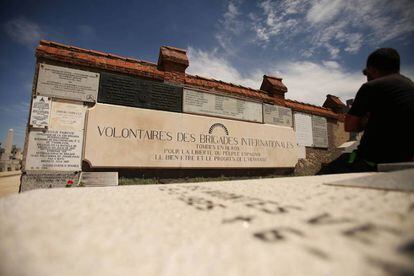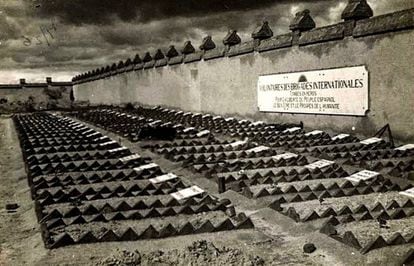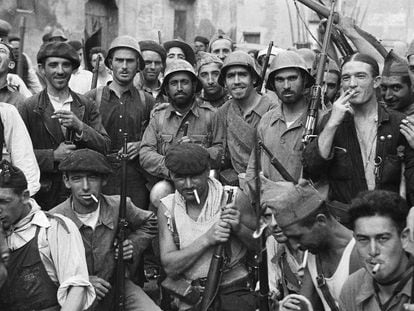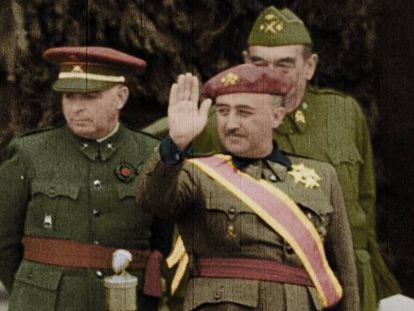Madrid cemetery repairs may uncover International Brigades mass grave
Site where bodies of 400 Spanish Civil War volunteers were dumped near graveyard has never been located
The possible discovery of a mass grave containing the remains of at least 424 International Brigade volunteers from 16 countries, along with another where some 64 people are buried – both hastily dug in the first months after the outbreak of the Spanish Civil War in July 1936 – could mean an end to renovation work at a cemetery in Fuencarral, in the northeastern outskirts of Madrid.

The larger of the two graves is believed to contain the bodies of International Brigade volunteers who came to Spain from all over the world to fight against the military uprising of General Francisco Franco. Among the war victims in the second grave, meanwhile, are likely to be a number of members of the Spanish fascism-inspired party the Falange, who supported the coup to overthrow the Second Republic, along with others murdered in the early days of the war.
Madrid City Hall says that neither are in danger, adding it will use ground-penetrating radar to survey the area before any work is carried out to repair walls in the cemetery.
I think it is a good idea to carry out an exploration before any work goes ahead Severiano Montero, Association of Friends of the International Brigades
In January, around 100 meters of the wall surrounding the cemetery began to collapse. City Hall has set aside almost €2 million on work to restore the perimeter, as well as walkways and graves.
Luis Avial Bell, who runs a geophysical exploration company that has worked on around 100 Civil War mass graves – and who led the team that helped find the tomb of Don Quixote author Miguel de Cervantes in Madrid – knows the history of Fuencarral cemetery well, and explains that during the Civil War it was the burial site for hundreds of International Brigade volunteers, as well as for at least 64 victims of the violence that erupted in the days after Franco’s uprising, some of them men and women who would have been accused by anarchists and communists of supporting the coup.
Today, plaques at the cemetery commemorate the dead in both sides in the conflict.

Between 1936 and 1937, Hungarian general and writer Máté Zalka, who fought under the name of Pavel Lukács, and who commanded the 12th International Brigade, requested permission from the authorities in Fuencarral to bury the growing numbers of dead in the fight to defend Madrid from Franco’s forces. In 1940, after the war, the Franco regime exhumed the Americans, Canadians, British, French, German, Italians, Poles, Austrians, Bulgarians, Russians, Greeks, Spaniards and other nationalities buried there and dumped their bodies in an unmarked mass grave nearby.
Avial says he fears that the mass grave containing the bodies of International Brigade volunteers could be in an area where the cemetery was subsequently extended to, or that it is now in the adjoining El Pardo park. The 64 bodies of Falangists and those accused of supporting Franco murdered in the early days of the war remain in the cemetery.
One of the graves is thought to contain at least 424 International Brigade volunteers from 16 countries
Avial has written to Madrid City Hall offering to carry out investigations using both a non-intrusive, ground-penetrating radar examination and a profilometer, a device that measures the surface of the ground. He believes this would establish that there are human remains there. If so, no further work could be carried out, as stipulated by Spain’s Historical Memory Law, legislation passed in 2007 to protect the rights and establishes measures in favor of those who suffered prosecution or violence during the Civil War and the subsequent dictatorship of Franco.
Severiano Montero, head of the Association of Friends of the International Brigades (AABI), also believes the exhumed remains could be close to the cemetery, or even within it. “I think it is a good idea to carry out an exploration before any work goes ahead,” he says. City Hall says it is happy to discuss the renovation work at the cemetery with Avial and the AABI, adding that before any work goes ahead, an examination of the area will be carried out and if any human remains are found, the work will be halted.
English version by Nick Lyne.












































